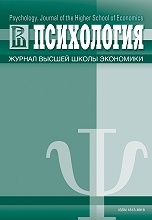Cultural Relevance of Abilities and Psychometric Properties of Cognitive Tests
Abstract
The article discuss the issue of relations between intelligence and socio-cultural environment. The subject is approached in the framework of structural dynamic theory of intelligence. The central question of biological and cultural approaches is “How is the intelligence formed and which factors are the pivotal?” The advantage of the structural dynamic approach is that while it accepts the facts of the biological approach, it reinterprets them and shows the role of social and cultural factors. The structural dynamic approach uses concepts “cognitive potential” and “cultural relevance of intellectual functions”. The cognitive potential of an individual (as reflected in the general factor of intelligence — g) may be allocated to various spheres, depending on tasks that are imposed by cultural and social environment. The cognitive potential is manifested to a greater degree in abilities, which are more demanded by the environment. The article discusses the mechanisms of influence of the environment on the structure of intelligence. The structure of intelligence in characterized by the set of factors, included into g, by the relations between those factors, and by the level of development of abilities, which are constitute various factors. According to the proposed approach, the socio-cultural environment does not influence the set of factors, included in the structure of intelligence, but it changes the relations between the factors, and the scores of these factors in the sample. The empirical data is provided that proves this perspective. Thus, for example, cross-cultural studies show invariance of the factor structure in the samples from different countries, but low cross-national validity of the test norms. The data of the authors’ research with Wechsler test shows that the value in the society of any given cognitive ability is linked with its loading on the general factor and the indices of heritability.
Downloads
References
Agranovich, A. V., & Puente, A. E. (2007). Do Russian and American normal adults perform similarly on neuropsychological tests? Preliminary findings on the relationship between culture and test performance. Archives of Clinical Neuropsychology, 22, 273-282.
Boivin, M. J., Giordani, B., & Bornefeld, B. (1995). Use of the tactual performance test for cognitive ability testing with African children. Neuropsychology, 9, 409-417.
Carpenter, P. A., Just, M., & Shell, P. (1990). What one intelligence test measures: A theoretical account of processing in the Raven’s progressive matrices test. Psychological Review, 97, 404-431.
Carroll, J. B. (1993). Human cognitive abilities: A survey of factor-analytic studies. Cambridge, UK: Cambridge University Press.
Herrnstein, R. J., & Murray, C. (1994). Bell curve: Intelligence and class structure in American life. New York: Free Press.
Leon-Carrion, J. (1989). Trail making test scores for normal children: Normative data from Spain. Perceptual and Motor Skills, 68, 627-630.
Liu, J., & Lynn, R. (2011). Factor structure and sex differences on the Wechsler Preschool and Primary Scale of Intelligence in China, Japan and United States. Personality and Individual Differences, 50(8), 1222-1226. https://doi.org/10.1016/j.paid.2011.02.013
Roivainen, E. (2010). European and American WAIS III norms: Cross-national differences in performance subtest scores. Intelligence, 38(1), 187-192. https://doi.org/10.1016/j.intell.2009.10.001
Rosselli, M., & Ardila, A. (2003). The impact of culture and education on non-verbal neuropsychological measurements: A critical review. Brain and Cognition, 52(3), 326-333. https://doi.org/10.1016/S0278-2626(03)00170-2
Ushakov, D. V. (2011). Psikhologiya intellekta i odarennosti [The psychology of intelligence and giftedness]. Moscow: Institute of Psychology of Russian Academy of Sciences.
Valueva, E. A., & Ushakov, D. V. (2013). Cultural relevance and properties of intelligence measures: Testing the structural-dynamic theory. Psychology. Journal of Higher School of Economics, 10(3), 29-40. (in Russian)





